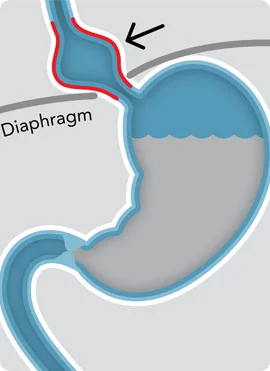Hiatal
Hernia

WHAT IS A HIATAL HERNIA?
A hiatal hernia occurs when the upper part of your stomach bulges through the large muscle separating your abdomen and chest (diaphragm). Your diaphragm has a small opening (hiatus) through which your food tube (esophagus) passes before connecting to your stomach. In a hiatal hernia, the stomach pushes up through that opening and into your chest.
A small hiatal hernia usually doesn’t cause problems as patients may never know they have one unless discovered by their doctor. Large hiatal hernias can allow food and acid to back up into your esophagus, leading to heartburn. A very large hiatal hernia might require surgery.
SYMPTOMS
Most small hiatal hernias cause no signs or symptoms. But larger hiatal hernias can cause:
- Difficulty swallowing
- Chest or abdominal pain
- Heartburn
- Regurgitation of food or liquids
- Backflow of stomach acid into the esophagus (acid reflux)
- Shortness of breath
- Vomiting of blood or passing of black stools, which may indicate gastrointestinal bleeding
CAUSES
A hiatal hernia occurs when weakened muscle tissue allows your stomach to bulge up through your diaphragm. It’s not always clear why this happens. But a hiatal hernia might be caused by:
- Injury, trauma or certain types of surgery
- Age-related changes in your diaphragm
- Being born with an unusually large hiatus
- Persistent and intense pressure on the surrounding muscles, such as while coughing, vomiting, straining during a bowel movement, exercising or lifting heavy objects
RISK FACTORS
Hiatal hernias are most common in people who are:
- Age 50 or older
- Obese




